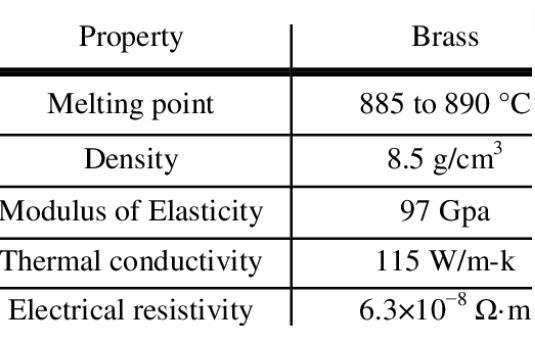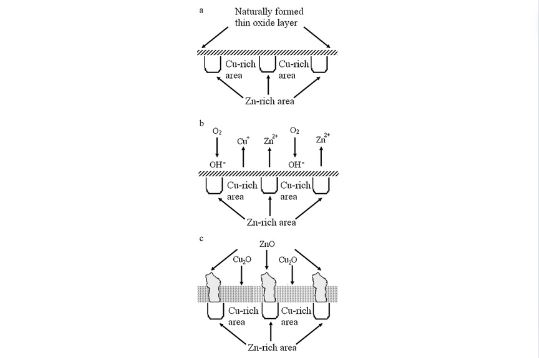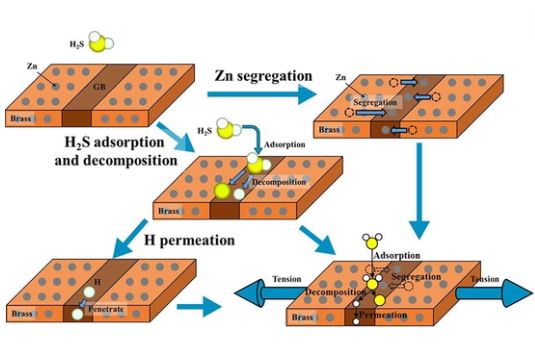Brass is an alloy that primarily consists of Copper, about 60%, and Zinc, about 40%.Brass is gold in.It is very versatile thanks to its dense and easy-to-shape nature.
Does Brass Rust?
NO, brass does not rust. This is because brass does not contain Iron. Remember, copper does not rust and so is zinc that is rust resistant.
Remember, zinc and copper are the main alloying elements in brass.
However, despite brass not rusting it can corrode especially when exposed to extremely harsh conditions. Tarnishing is one of the most popular types of corrosion that can affect brass resulting in a dull layer on its surface due to oxidation.
The layer on the surface is known as patina. It is greenish and it is composed of copper carbonate. In even harsher environments brass can undergo dezincification. This is where zinc is selectively taken away leaving only copper that can weaken the material.
Brass Rusting Properties vs. Alloy Composition
Brass contains copper, zinc, and additional alloying elements. Hereare how these compositions influence their properties.
- Zinc – Zinc is added to increase strength and ductility. However too much zinc content may cause dezincification, especially in very harsh environments. Brasses with lower zin content such as naval brass and tin offer very good corrosion resistance.
- Copper-High copper content increases Brass’s resistance to corrosion. This is because copper reacts with moisture and oxygen to form a protective layer. This layer shields the metal underneath from corrosion Red brasses with more copper content of about 80% are more resistant than yellow brasses with about 60-70% copper
- Additional alloying elements– adding Tin helps improve resistance to dezincification and overall corrosion while lead improves machinability. Aluminum improves both strength and corrosion resistance.

Comparing Brass Rusting to Brass Oxidation and Brass Tarnish
Brass Oxidation-Brass contains copper. When brass is exposed to air and moisture it reacts to form a copper oxide on the surface. It is a form of protective layer protecting brass.
Brass oxidation can lead to a change of colour particularly into a greenish patina.
Brass Rusting-brass does not rust. This is because brass does not contain Iron. Rust results from iron and its alloys reacting with oxygen and moisture to form iron oxide. Brass is an alloy of copper and zinc that does not rust.
Brass Tarnish-It involves a chemical reaction between copper in the brass and Sulphur-containing compounds to form copper sulfide. This results in a darkened layer on the surface. Unlike rust, tarnish can be cleaned off to restore brass’s original luster.

Factors Affecting Brass Corrosion and Rusting
·Composition of Brass
High copper content in brass increases its corrosion resistance. High zinc content in brass makes it susceptible to dezincification. Alloying elements like tin, silicon, and aluminum enhance corrosion resistance.
· Environmental Conditions
Moisture accelerates the corrosion process but not rusting. Saltwater environments cause dezincification. High acidity also increases the rate of corrosion.
· Chemical Exposure
Environments with sulfur can result in copper sulfide which can lead to tarnishing. Ammonia can cause stress corrosion cracking in brass.
· High Temperatures
Very high temperatures speed up the corrosion process in aggressive environments.
· Mechanical Stress
Stress corrosion cracking can affect strained brass components since they are vulnerable.
· Protective Coatings
Applying protective layers reduce the rate of corrosion.

Applications of Brass due to Rust Resistant Properties
· Plumbing Accessories
In marine and plumbing brass is used to make marine hardware such as marine fasteners, plumbing fixtures, and water pumps and pipes due to its corrosion resistance.
· Electrical Connectors
Brass has good conductivity and resistance to oxidation making it ideal for electrical connectors, terminals, and sockets. It also ensures long-lasting electrical performance. Due to its mechanical durability, it is also suitable for electrical pin connectors and switch components.
· Musical Instruments
Musical instruments such as tubas, trumpets, trombones, and French horns are made from brass. Brass has perfect acoustic and workability properties.
· Decorations in Architectural Structures
Brass is ideal for decorative and architectural uses. You can use it to decorate ornamental pieces such as lamps, railings, and door handles. It is also useful in architectural hardware for architectural fittings that need aesthetic appeal and durability.
· Automotive Parts
In the automotive industry, brass is good for automotive radiators and heaters because of its good thermal conductivity and resistance to corrosion by coolant fluids.
· Bearings and Bushings
Manufacturing industries need brass for bearings and bushings where low friction and resistance to wear and corrosion are important. Brass also aids in the manufacturing of gloves used to operate in corrosive environments.
· Rust Resistant Coins
Several coins are made from brass because of their resistance to tarnish, durability and ease of stamping.
· Weapons
Non-sparking tools that are meant for use in explosive environments such as chemical manufacturing are made from brass.
Brass is popularly used for ammunition casings because it does not rust, it is easy to work with and it is resistant to corrosion.
FAQs
Does Brass Rust in Water?
No, brass does not rust in water. Brass can only corrode and this happens when it is exposed to extreme conditions.
Does Brass Jewelry Rust?
No it does not. Brass jewelry is made up of brass and brass does not rust. However, brass jewelry can tarnish when you expose it to certain conditions.
Does Brass Necklace Rust?
Brass is one of the most desired metals because of its high corrosion resistance. So no, brass necklace does not rust but can only tarnish.
How Fast Does Brass Rust?
Brass does not rust. It can only corrode when exposed to extreme conditions. The corrosion does not happen overnight rather it happens over time and gets worse each day.
Will Brass Rust in Salt Water?
Brass does not rust. However, when exposed to salty water it corrodes.
What is Brass Dezincification?
Brass dezincification is a kind of corrosion that takes away zinc from brass alloys. This causes a weakened and porous structure.
What Color Does Brass Rust?
- It’ll take on a blue-green color
Does Brass Rust Outside?
- Brass is a durable, corrosion-resistant metal that can function well outdoors. Rust is no concern with these materials
Does Brass Rust Easily?
Brass is a zinc and copper alloy, neither of which can rust, it is also stronger than pure copper.
Conclusion
In conclusion, Brass does not rust because it does not contain Iron. Iron reacts with water and moisture to form iron oxide which is rust. Brass contains Zinc and Copper that do not rust.
More resources:
A Comparison Between Red Brass Vs Yellow Brass – Source: KDM
Is Brass Magnetic? – Source: KDM
How to Polish Brass Products in Simple Steps – Source: KDM
Types of Brass Finishing – Source: KDM
What is the Difference between Brass and Copper? – Source: KDM
Top 20 Brass Manufacturers in China – Source: KDM
Bronze Vs Brass Comparison Guide – Source: KDM




